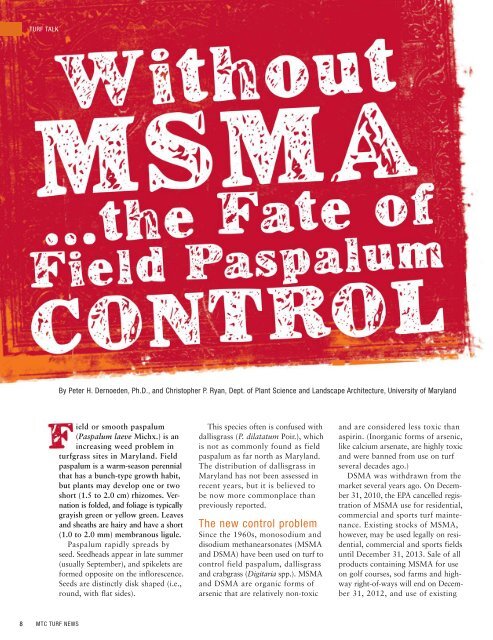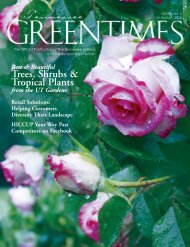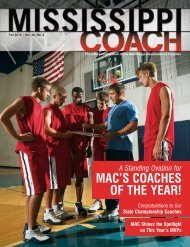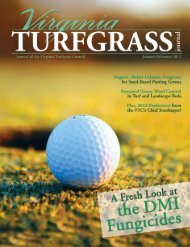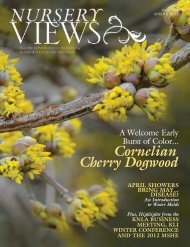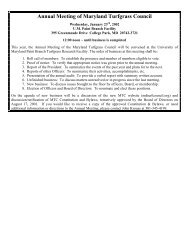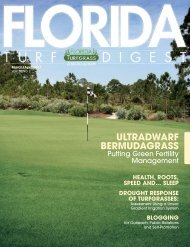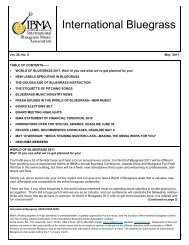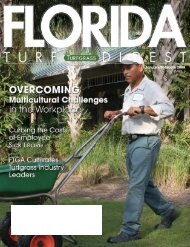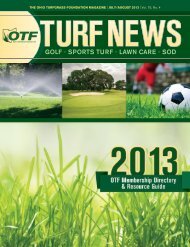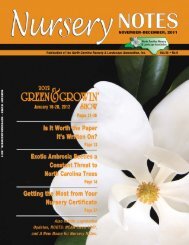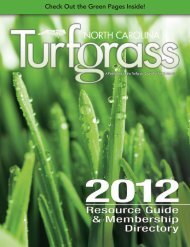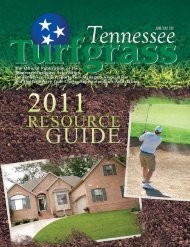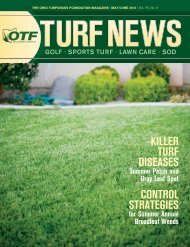the Fate of Field Paspalum Control - The Paginator
the Fate of Field Paspalum Control - The Paginator
the Fate of Field Paspalum Control - The Paginator
Create successful ePaper yourself
Turn your PDF publications into a flip-book with our unique Google optimized e-Paper software.
TURF TALK<br />
By Peter H. Dernoeden, Ph.D., and Christopher P. Ryan, Dept. <strong>of</strong> Plant Science and Landscape Architecture, University <strong>of</strong> Maryland<br />
ield or smooth paspalum<br />
(<strong>Paspalum</strong> laeve Michx.) is an<br />
increasing weed problem in<br />
turfgrass sites in Maryland. <strong>Field</strong><br />
paspalum is a warm-season perennial<br />
that has a bunch-type growth habit,<br />
but plants may develop one or two<br />
short (1.5 to 2.0 cm) rhizomes. Vernation<br />
is folded, and foliage is typically<br />
grayish green or yellow green. Leaves<br />
and sheaths are hairy and have a short<br />
(1.0 to 2.0 mm) membranous ligule.<br />
<strong>Paspalum</strong> rapidly spreads by<br />
seed. Seedheads appear in late summer<br />
(usually September), and spikelets are<br />
formed opposite on <strong>the</strong> inflorescence.<br />
Seeds are distinctly disk shaped (i.e.,<br />
round, with flat sides).<br />
This species <strong>of</strong>ten is confused with<br />
dallisgrass (P. dilatatum Poir.), which<br />
is not as commonly found as field<br />
paspalum as far north as Maryland.<br />
<strong>The</strong> distribution <strong>of</strong> dallisgrass in<br />
Maryland has not been assessed in<br />
recent years, but it is believed to<br />
be now more commonplace than<br />
previously reported.<br />
<strong>The</strong> new control problem<br />
Since <strong>the</strong> 1960s, monosodium and<br />
disodium methanearsonates (MSMA<br />
and DSMA) have been used on turf to<br />
control field paspalum, dallisgrass<br />
and crabgrass (Digitaria spp.). MSMA<br />
and DSMA are organic forms <strong>of</strong><br />
arsenic that are relatively non-toxic<br />
and are considered less toxic than<br />
aspirin. (Inorganic forms <strong>of</strong> arsenic,<br />
like calcium arsenate, are highly toxic<br />
and were banned from use on turf<br />
several decades ago.)<br />
DSMA was withdrawn from <strong>the</strong><br />
market several years ago. On December<br />
31, 2010, <strong>the</strong> EPA cancelled registration<br />
<strong>of</strong> MSMA use for residential,<br />
commercial and sports turf maintenance.<br />
Existing stocks <strong>of</strong> MSMA,<br />
however, may be used legally on residential,<br />
commercial and sports fields<br />
until December 31, 2013. Sale <strong>of</strong> all<br />
products containing MSMA for use<br />
on golf courses, sod farms and highway<br />
right-<strong>of</strong>-ways will end on December<br />
31, 2012, and use <strong>of</strong> existing<br />
8 MTC TURF NEWS


